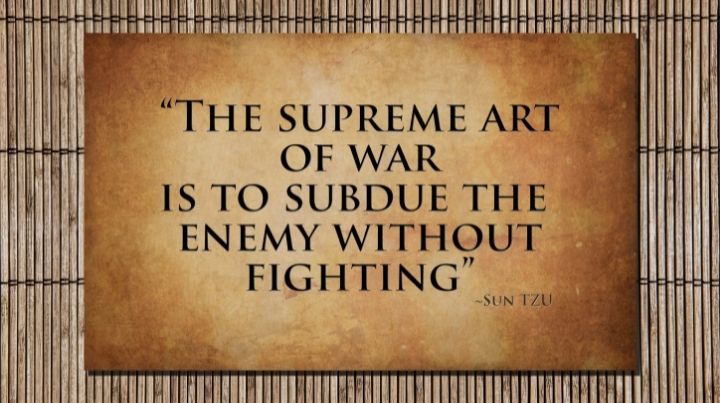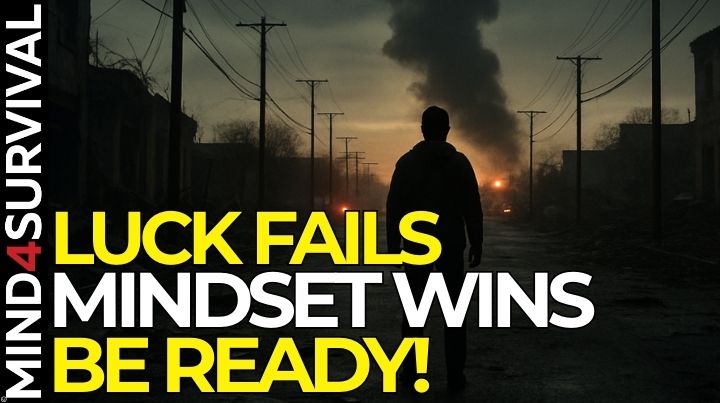M4S 059: 4 Prepping Tips Straight from The Art of War


Podcast: Play in new window | Download
Have you ever looked at prepping tips through the eye of Sun Tzu and The Art of War? The wisdom of that book can apply to many different scenarios, including prepping. This post will discuss prepping tips that are a repeating theme in Sun Tzu's, The Art of War.
If you’ve been prepping for more than two minutes, you probably know that there are a lot of resources, especially books, available to help with our readiness and preparedness. Let me ask you, though, when it comes to books and preparedness, what do you think is the best guide out there?
Well, while it’s open for debate, I believe one of the best books to help with the prepping mindset is Sun Tzu’s The Art of War.
Why The Art of War Has the Best Prepping Tips
Now, if you haven’t heard of Sun Tzu and The Art of War, you have some reading to do. That’s because The Art of War is one of, if not the, oldest, surviving manuscripts on military strategy. Not only is it one of the oldest, but it is arguably the most influential book on warfare ever written. It is so useful that The Art of War is no longer just a book on war strategy but is also sold as a self-help book, an aid to prepping tips, used in business by corporate leaders, and is required reading across a variety of topics and courses.
The Art of War Prepping Tips Apply Across the Board
These lessons and others like them that are found in the Art of War not only apply to our prepping when things go wrong, but they also lay out an excellent roadmap for how we can approach difficult situations and our daily lives in general.
#1) Situational Awareness
“If ignorant both of your enemy and yourself, you are certain to be in peril.” ~Sun Tzu
Prepare in advance
Train and do your research about whatever you're dealing with ahead of time. Remember, train to a standard, not to time or other artificial definition of success. When you do, you'll get to where you want to be much faster than if you hadn't.
Know and understand you and your enemy’s capabilities and limitations. When you know and understand yourself and the opposition, you'll be better prepared to overcome any obstacles.
Be honest when evaluating yourself and others. Honesty is the only real way to know if you're capable of something or not. Remember, you don't need to impress people. Just be excellent at what you do, honest and humble, and you'll be all set to go.
Stay Observant
As Westerners, we tend to be easily distracted and not pay attention as well as we should. Just think about distracted drivers, people on the phone walking into poles, and worse. We need to focus and pay attention.
While focusing is good, hyper-focus can be wrong. Don’t become hyper-focused. Hyper-focused can distract you from seeing the bigger picture or noticing small things that matter.
Utilize all of your senses, including your subconscious. We all know to use our sense of sight, hearing, and others, but many of us forget to use our instincts and minds-eye to help protect us. Instinct is perhaps the most essential and useful skill for us to master.
Listen to Your Instincts.
If something looks, feels, or seems wrong, it probably is. Avoid letting personal and cultural bias inhibit your instincts. Instinct doesn't know the culture and political correctness. So, don't let yourself become weighed down when responding to warnings from your instincts.
Talk your feelings or thoughts through with others. When you do, you'll help the feeling sink in that your instincts are probably right.
2) Be the Gray Man
“Be extremely subtle even to the point of formlessness. Be extremely mysterious even to the point of soundlessness. Thereby you can be the director of the opponent's fate.” ~Sun Tzu
Don’t stand out
Mentally commit NOT to stand out. If a person wants to stand out, they will. When they are not committed to blending in, the odds of bad things happening go up.
Try to look non-threatening. Try to make yourself appear meek, mild-mannered, etc. By not appearing memorable or noticeable, you increase your chances of avoiding trouble and not being noticed or remembered.
Try to move with the crowd and not against or across it. Should you push against the crowd, you can cause easy to notice disturbances in the flow of the crowd. When you think of moving with the crowd, approach it as if you're trying to walk through a river without making a significant disturbance in the water flow.
Dress Down
Dress like locals or other nationalities that are appropriate for your age, ethnicity, etc. If you're older, avoid wearing clothes that appeal to the young crowd and vice-versa. It's also a good idea not to look like a tactical mall ninja. While tactical types of clothing are often durable and worthwhile, they stick out like a sore thumb for anyone who knows what to look for.
Keep electronics, flashy items, etc., put away and out of sight. Flashy accessories and such attract attention. For example, wear a watch that ordinary people wear. Exposing expensive or uncommon items in the view of others may make some people study you more intently.
Avoid carrying anything that makes you look important. Remember, less is more, so keeping your hands free and not toting stuff around is beneficial both defensively and when playing the gray man.
Act Like the Locals
When traveling or working somewhere outside of your usual area, make sure you learn the normal cultural customs, physical mannerisms, and such. When you do, you'll begin to fit in better. Also, those with whom you do interact are less likely to pay additional attention to you. One good place to observe locals is at an airport where people are used to strangers from around the world sitting and watching for hours.
When acting like a local, try to stay in more populated and well-traveled areas. It’s easier to notice someone is different if they are on their own and easily observed. However, when a person is mixed into a crowd, as long as they don't stand out appearance or action-wise, they tend to blend in more.
It’s doubtful you’ll be able to act entirely like a local, but any reasonable effort to do so will help you put locals at ease and be less noticeable.
3) Positive Mental Attitude (PMA)
“Treat your men as you would your own beloved sons. And they will follow you into the deepest valley.” ~Sun Tzu
Stay Upbeat and Optimistic.
A person who is upbeat and optimistic is infectious. When they infect others, they motivate and inspire them to improve and positively influence the situation. Do you know people who are always negative? If you do, you also know that their negativity can suck the life out of you and make a bad situation worse.
Act calm, polite, and professional (non-angry). When you treat others well and are courteous, you'll stand out less and find yourself making progress that those who act up experience.
Believe in yourself and expect to be successful. If you plan to lose, then you increase your chances of doing just that, losing. However, if you believe in yourself, others will as well, and your chances of success increase because of your optimism.
Remain Flexible
Things don’t always go as planned. When things do go sideways, expect it, be ready for it, and don't let it rattle you.
Expect the unexpected and plan for the impossible. Be ready to notice and admit that the situation is changing. Also, when the unexpected happens, find a way to turn the negative into a positive.
When you do, you'll find that you create your opportunities and are on the path to success far more often than if you let the evolving situation get the better of you.
Avoid Drama
Drama is for the theater and high school, not for the adult world and especially not the adult SHTF world. When things are going wrong, or we're under stress, the last thing we need to do is add to the problem.
When it comes to drama, the only thing that is guaranteed is that it causes more problems than it solves, a lot more. Letting drama happen or participating in the drama does little, if any, good.
Part of avoiding drama means not to be a gossip. As the old saying goes, if you don’t have anything good to say, don't say anything at all. Gossip causes hard feelings, wastes time, and usually accomplishes nothing.
4) Be a Team Player
“A good commander is benevolent and unconcerned with fame.” ~Sun Tzu
Cross Leverage Skills and Abilities Across the Group
Use your skills to help others and to help build the team. When you do, you will also be helping yourself.
It's always vital to play to people’s strengths while minimizing their weaknesses. Let's face it, we all have our pros and cons. How do you think you'd feel and perform if someone always had you do something you are terrible at? Now, how would you do if you worked on something that you are good at and enjoy? It's simple, really: treat others the way you want to be treated.
Make sure you train one another on individual skills that they may not do well with. When you do, over time, you'll increase the overall resiliency of the team and the individuals. By cross-training one another, everyone will be better prepared to step up and make a positive impact when needed.
Always be Reliable, Honorable, and Humble.
Be the person people can count on to both do what you say and say what you do. Think about the old saying, “Say what you mean and mean what you say.” People like to know that others are reliable, honorable, and humble. No one wants a liar or someone who is self-centered and unreliable. Don't be that guy!
Develop positive relationships with others by giving people an opportunity to excel. When you do, they will be very appreciative of you for doing so. Besides, you never know. Maybe you'll end up helping someone to realize they're good at doing something that you either dislike or that is very beneficial to you and the group.
Don’t take people for granted or treat them poorly. Remember, these are the people you will have to count on when things take a turn for the worse, so treat them well. In the end, it's much more enjoyable and productive to treat people well. That doesn't mean you can't speak up if they're doing something wrong. In that case, be firm but fair.
Commitment to the Team and Its Mission
Commitment to the team means that you give it your all. When doing anything, give 100% and then some. We all know that hard things take effort. By giving 100% now, you’ll be better prepared to give 100% when times are hard and the energy you provide matters genuinely. Think about it, do you want to have it easy in training only to find out you aren't prepared when the time comes, or vice versa?
It's also a good idea to take the time to make others a priority. As you do, you'll help the team, yourself, and others to improve and find out what they are truly capable of.
Lastly, you want to make a positive change. However, you want to do so without stepping on other people's toes. So, help drive change and improvement within the team by causing the change in small, thought out, incremental steps that don't cause problems.
The Bottom Line on Prepping Tips from The Art of War
Prepping tips don't just come from prepping books. Improvements in your preparedness can come from many unusual sources. Have you found other non-prepping books to be helpful with prepping? If so, please leave a comment below. I’m looking forward to seeing what you all come up with.
Additional Resources:
Stay safe,

Related Articles
FREE Guide
Read the Best Seller
Join Mind4Survival
Stay informed by joining the Mind4Survival! 100% Secure! 0% Spam!
Affiliate Disclosure...
Mind4Survival is a free, reader supported information resource. If you make a purchase through our link, we may, at no cost to your, receive an affiliate commission.
Do You Want To Be Ready No Matter What?

Download our free 39-page guide with interactive, 7-Day Emergency Kit Checklist and take the first step toward real preparedness.
- Know exactly where to start.
- Save time and money.
- How-to build a complete Basic Emergency Kit.
- Level up your safety and security.
Join Mind4Survival
Stay informed by joining the Mind4Survival! 100% Secure! 0% Spam!






Wow! This podcast hit home with me and really spoke to the things that are currently happening in my life. It’s almost as if Brian was a fly on the wall in my house! I am a firm believer that if you’re not happy in your life then you need to fix it. No one else can do that for you. I had been looking for some instruction, direction, and some control and this is just what I needed. I’m now ready to start fixing things to get my happy mind and my security back.
I’ll definitely be checking out the “Art of War”. The books that have influenced me the most are all fiction and I have yet to check out any of the prepping guides so this is a good place to start!
Thanks, Jennifer! Keep us posted on your thoughts about Sun Tzu and preparedness.